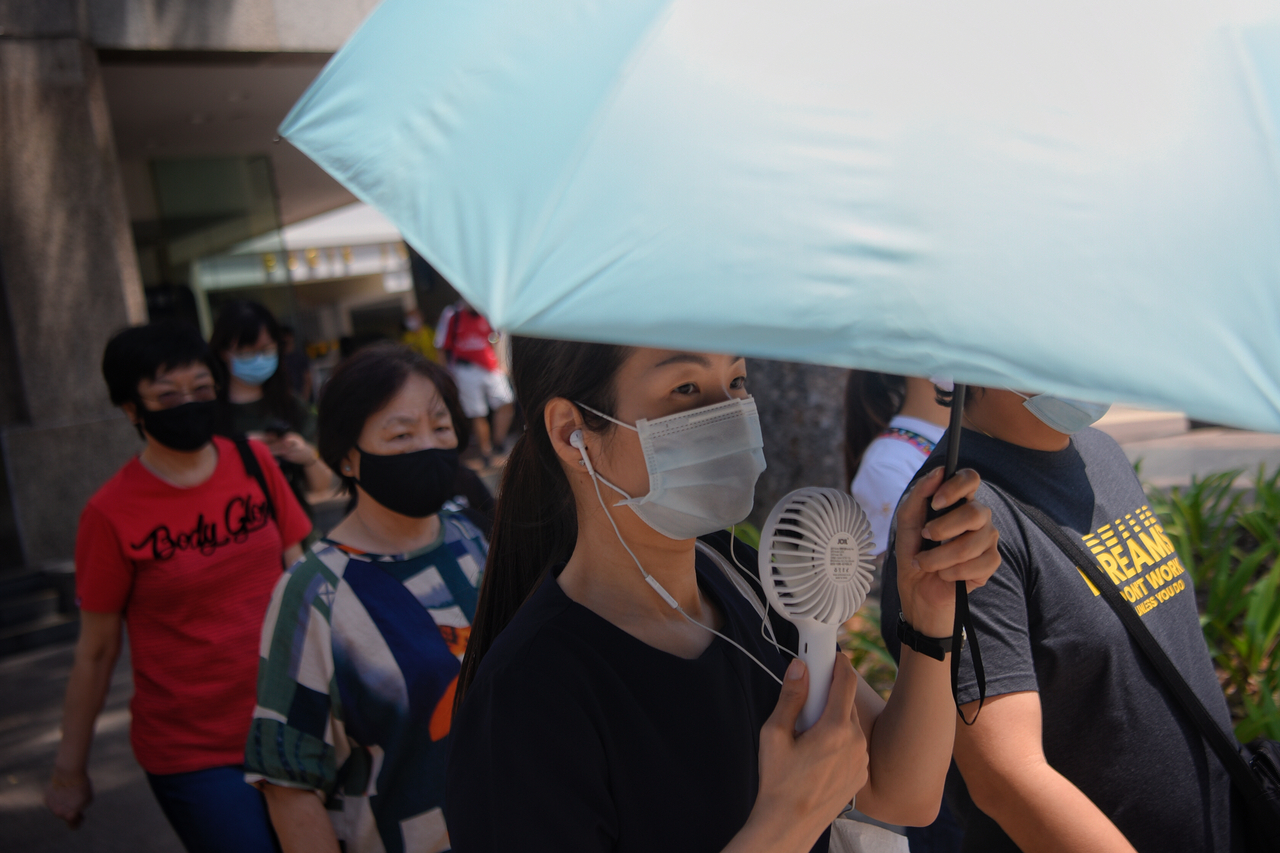S'pore weather blowing hot and cold: Beware of asthma, eczema flaring up, say doctors
Sign up now: Get ST's newsletters delivered to your inbox

One condition that is more likely to occur with the transition from cold to hot weather is heatstroke.
ST PHOTO: MARK CHEONG
Follow topic:
SINGAPORE - This year has been off to a rainy and windy start with temperatures as low as 21.1 deg C but drier and warmer weather is expected in the coming weeks, says the weatherman, with temperatures possibly hitting 34 deg C.
What does the changing weather mean for our health?
Dr Samuel Low, a clinical director at private healthcare provider Parkway Pantai, said the change in humidity can weaken a person's immune system, making one more susceptible to germs and viruses, and more likely to fall sick.
One condition that is more likely to occur with the transition from cold to hot weather is heatstroke, said Dr Goh Lit Ching, a resident physician at private medical centre Icon Health Screening.
It is caused by the body overheating, usually as a result of prolonged exposure to or prolonged physical exertion in high temperatures with a lack of hydration.
The symptoms of heatstroke include high body temperature, confusion, nausea and vomiting, flushed skin, headache, rapid and shallow breathing and a racing heart rate. In serious cases, a heatstroke can lead to seizures and coma.
To avoid a heatstroke, individuals should apply sunblock, drink plenty of fluids, and wear loose-fitting clothing in hot weather.
Said Dr Goh: "People should also take extra precautions if they are on medication that can affect their body's ability to stay hydrated and respond to heat."
Another condition that may flare up in hot weather is atopic dermatitis, or eczema, which makes the skin red and itchy, said Dr Leong Choon Kit, a family physician at Mission Medical Clinic.
He said: "Some people may be very sensitive to changes in the environment, whether it is the temperature, humidity or dust level. This can cause allergies and inflammation on the skin or compromise the immune system."
The symptoms of eczema include skin itchiness, dry skin, cracked and scaly skin. Sweating under hot and humid weather can also trigger skin irritation in a person who has eczema, said Dr Goh.
Dr Goh advised sufferers of the condition to moisturise their skin to prevent it from becoming dry. Sufferers should also avoid wearing rough, tight or scratchy clothing as this may irritate the skin.
Asthma, a condition in which the airways narrow and swell and produce extra mucus, may also worsen in humid weather, noted Dr Goh. It can flare up due to triggers such as exercise or may be allergy-induced.
In extreme heat, the presence of aeroallergen such as pollen and pet dander is higher and may trigger an allergic reaction. This can aggravate the respiratory system and cause frequent asthma attacks, explained Dr Goh.
The symptoms of asthma include coughing, wheezing and shortness of breath.
He said influenza and pneumonia vaccination can help prevent asthma flare-ups caused by these respiratory illnesses.
Dr Leong advised individuals to observe personal hygiene and wear masks at all times when outdoors to avoid infections. People can also self-medicate by taking antihistamines, an allergy medication, in the event of allergies, he said.
Said Dr Goh: "Although a change in the weather is not a direct cause of medical diseases, it can serve as an indirect precipitating factor in many chronic illnesses.
"The overall health effects of a changing climate are overwhelmingly negative."
5 tips on staying healthy
Dr Goh Lit Ching, a resident physician at private medical centre Icon Health Screening, shares five tips on how to stay healthy when the weather blows hot and cold.
1. Keep your home cool
Switch on the fan to cool your home.
2. Keep out of the heat
Avoid going out and doing strenuous physical activity during the hottest time of the day.
If you must do strenuous activity, do it during the coolest part of the day, in the morning or evening. Rest often in shady areas so that your body has a chance to recover.
3. Keep yourself hydrated
Wear light and loose-fitting clothes and keep your body cool by drinking more fluids, regardless of how active you are.
Do not wait until you are thirsty to drink.
You should avoid alcohol and too much caffeine and sugar as they can cause you to lose more body fluid. Consuming a sports drink can replace the salt and minerals you lose in perspiration.
4. Pace yourself
If you are not used to working or exercising in a hot environment, start slowly and pick up the pace gradually.
Get into the shade or a cool area to rest, especially if you feel light-headed, confused, weak or faint.
5. Wear sunscreen
Sunburn affects your body's ability to cool down and can make you dehydrated.
Protect yourself from the sun by wearing a hat, sunglasses or putting on sunscreen of at least SPF15 about 30 minutes before going out. Reapply the sunscreen according to the directions on the packaging.

